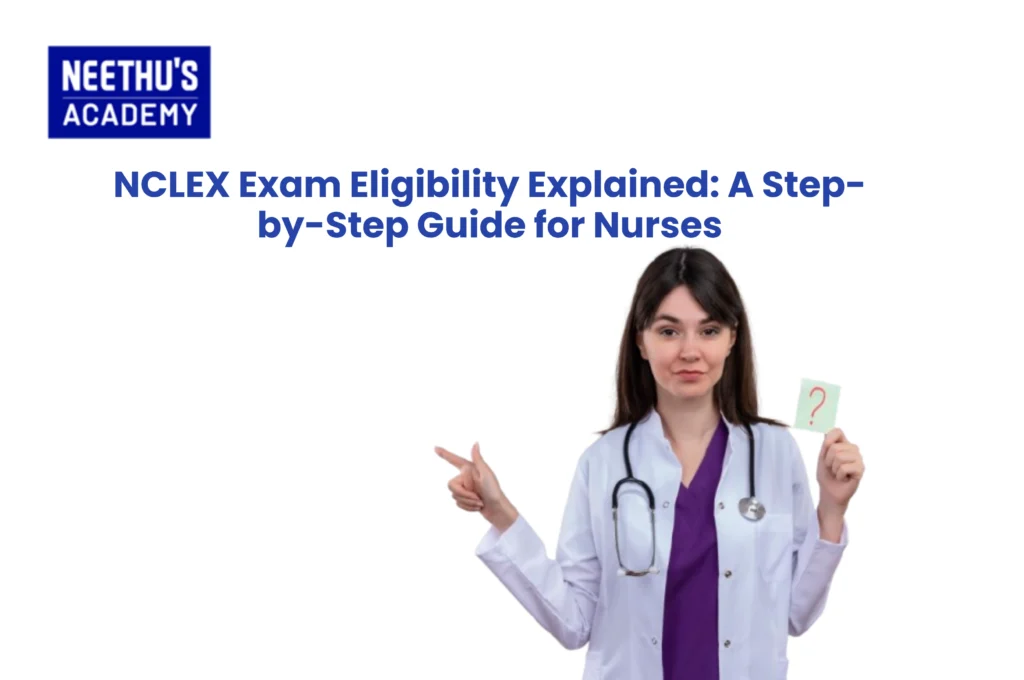Imagine you are running out of time and still have questions to complete! That would be the worst-case scenario while taking a…

NCLEX Exam Eligibility Explained: A Step-by-Step Guide for Nurses
After graduation, the first step towards becoming a licensed Practical/ Vocational Nurse (LPN/LVN) or Registered Nurse (RN) is passing the NCLEX Exam. In order to be licensed, any graduate from a nursing program must clear the exam in the US, Canada, and many other countries, as it is designed to test their clinical capability. To become licensed or practical nurses in the United States and Canada, graduating nurses have to take the National Council Licensure Examination or NCLEX. Eligibility requirements for passing the NCLEX test are something you need to know if you would like to quickly get started in your nursing career without any unwanted delays. We’ll go over the NCLEX exam eligibility requirements in this blog and walk you through the steps to make sure you’re ready to take this crucial test.
Overview Of the NCLEX-RN Exam
The NCLEX is the standardized test for determining a candidate’s knowledge, skills, and competencies required for safe and effective practice at the entry-level as a nurse. There are two forms of the NCLEX exam:
- The NCLEX-RN is a test for applicants who wish to work as registered nurses.
- The NCLEX-PN is available to students interested in becoming Licensed Practical Nurses, otherwise referred to as Vocational Nurses in some parts of the country.
The four foundations provided by the NCLEX include patient safety, health promotion, psychosocial integrity, and physiological integrity. Passing this exam is a critical milestone to practice nursing, as it forms a prerequisite for licensure in nursing in both the United States and Canada.
Why Meeting the NCLEX Eligibility Criteria is Important
You have to be qualified and fulfill the requirements to be eligible to apply for the NCLEX exam. Confirm ahead of time that all conditions are met so that registration is conducted without any problems while not causing unnecessary delays in your nursing career. If you do not qualify by failing to meet one or any of the eligibility criteria then your application may be rejected. The reapplication process will be time-consuming and add extra cost to the applications.
NCLEX Eligibility Criteria by Country/Region
Although the fundamental NCLEX requirements are universal for all countries and states, there is a wide regional and national scope based on the licensing bodies that enforce the rules. The eligibility criteria for NCLEX candidates from the USA, Canada, and other countries are explained below.
For the U.S
To qualify to sit for NCLEX in the United States, one must meet the requirements set below.
Graduating from an accredited nursing program: Training in a nursing program accredited by the Board of Nursing. Your BON must approve and recognize the nursing program in which you have trained.
Complete clinical hours: This is different in each state, and you will need to fulfill the number of clinical hours that your state requires of you for the nursing school.
Apply to State Board of Nursing: In the state where you will practice you should apply for licensure. Each BON has its own requirements, which may include background checks, fees, and documentation.
Your eligibility for the NCLEX shall be determined upon evaluation by a State Board of Nursing as to whether your clinical experience and educational background appropriately qualify you for licensure.
For Canada
The NCLEX is the only exam required for registration as a registered nurse in Canada. In Canada, in order to take the test, you have to:
Graduate from an approved nursing program: Canadian nursing programs, like those in the United States, need to be authorized by the regional or state nursing authorities.
Register with the regulatory agency in your province: You have to register with the provincial or territorial organization in charge of regulating nursing licenses in your area after completing your nursing study. They will review your application and determine if you’re eligible to take the NCLEX.
For International Applicants
You can also apply for the NCLEX even if you completed your nursing education outside of the United States or Canada; however, additional requirements may apply. Application from other countries requires
Review their credentials: To ensure your degree in a country other than the US or Canada, you may be asked to forward your transcripts and other educational credentials to credentialing service organizations, for example Commission on Graduates of Foreign Nursing Schools, (CGFNS).
Fulfill language proficiency requirements: Many states and provinces require foreign applicants to take tests in English, such as the TOEFL or IELTS.
Additional courses: International graduates may also require finishing additional courses or clinical training in certain countries.
Educational Requirements for NCLEX
Accredited Nursing Programs
Accreditation is very important for your nursing education. Both the Commission on Collegiate Nursing Education in the United States and the Accreditation Commission for Education in Nursing, in other recognized entities, will accredit nursing programs. Each province of Canada has its recognized accrediting body. For entry into a recognized nursing program, you can be sure that you are eligible for licensure with an education with minimum requirements.
Degree Levels
The degree that you hold also determines whether you are eligible to take the NCLEX. For the NCLEX, in general, the following degrees are recognized:
- A Diploma in Practical Nursing allows you to sit for the NCLEX-PN.
- Some nursing associate degree (ADN) graduates are eligible to take the NCLEX-RN.
- An associate’s degree in nursing is qualified for NCLEX-RN.
Clinical Hours
There is a mandatory number of clinical hours that candidates must obtain through nursing school. Clinical hours are an integral part of the qualification process that gives students hands-on experience in health settings. Although the number is different by province or state, it is crucial to ensure that your nursing program provides you with at least the required clinical experience for the state or province you want to be registered in.
Licensing Board Application Process
You must apply to your province’s regulatory authority (Canada) or your state board of nursing (United States) after fulfilling the necessary clinical and educational standards. The following are the standard steps in the application process:
Submitting a license board application: Usually, you may complete this online, and you’ll need to provide your personal information as well as specifics about your nursing training.
Providing proof of education: Transcripts from nursing school and any other supporting papers, like evidence of clinical hours completed, must be provided.
Application fee payment: fees vary depending on the state or province between $100 and $300 USD.
Complete criminal background check: Depending on the state, you may be required to have a criminal background check prior to taking the NCLEX.
After approval of your application, you should receive an Authorization to Test from the board. It is with this that you may register to take the NCLEX.
Special Eligibility Cases
International Nurses
Nurses with international education may have further eligibility requirements. This includes credential evaluations, language proficiency exams, and sometimes additional courses. Moreover, before being allowed to take the NCLEX, several states in the United States may require international applicants to pass the CGFNS Qualifying Exam.
Reciprocity
Because of reciprocity arrangements, those with nursing licenses in one state or country may be able to port those licenses into another without having to go through the NCLEX again. Of course, you would need to confirm precisely which reciprocal agreements exist for that particular state or country if you want to practice there, as not all states are parties to reciprocal agreement
Common Reasons for Application Denial
There are several reasons why NCLEX applications are rejected, among them being:
- Paperwork errors or incomplete documents.
- Failure to spend the prescribed or educational hours clinical.
- Failure to pass the required background check.
- Failure to meet language proficiency requirements for International applicants.
Countries Accepting NCLEX
Several countries accept the NCLEX as a licensure exam for nursing professionals, including:
- United States.
- Canada.
- Australia (with additional requirements).
New Zealand (with additional requirements).
Conclusion
To get a license to practice as a nurse in the United States or Canada, first of all, the NCLEX exam qualification should be achieved. If these eligibility standards are understood and met by an individual, it will ensure a smooth and successful journey to licensing, whether it is an international nurse who plans to work overseas or a fresh graduate. Following the procedures in this blog, you will be adequately prepared to begin a career in nursing as an accredited nurse and meet every NCLEX standard.
Related Blogs
- All Posts
- OET
In case you are immigrating to Canada or looking for higher studies in the French-speaking parts of the nation, then the TCF…
Feeling a bit overwhelmed about the OSCE? You're not alone! The Objective Structured Clinical Examination is a big step in your medical…
Course Enquiry
Latest Posts
- All Posts
- canada
- CBT
- DELF
- DHA
- French
- GENERAL
- German
- Haad
- IELTS
- IQN NEW ZEALAND
- LANGUAGECERT SELT
- MOH
- NCLEX-RN
- NHRA
- OET
- OSCE
- Pearson Vue
- PROMETRIC
- PTE
- TOEFL
- Back
- NCLEX - NGN
- Back
- OET FOR PHYSIOTHERAPIST
- OET FOR PHARMACIST
- OET FOR DOCTORS



Frequently Asked Questions
A recognized nursing degree, evaluation of their qualifications by an agency such as CGFNS, meet English language proficiency standards, and application through a U.S. State Board of Nursing are some of the requirements that the Indian nurses need to ensure for sitting the NCLEX exam.
The US, Canada, Australia, and New Zealand-all accept the NCLEX. However, for Australia and New Zealand, some requirements are different.
No, However, candidates must have completed their nursing degree.
NCLEX should be administered to any nursing graduate from an accredited program, foreign nurses seeking licensure in the United States or Canada and nurses transferring between states or countries.
